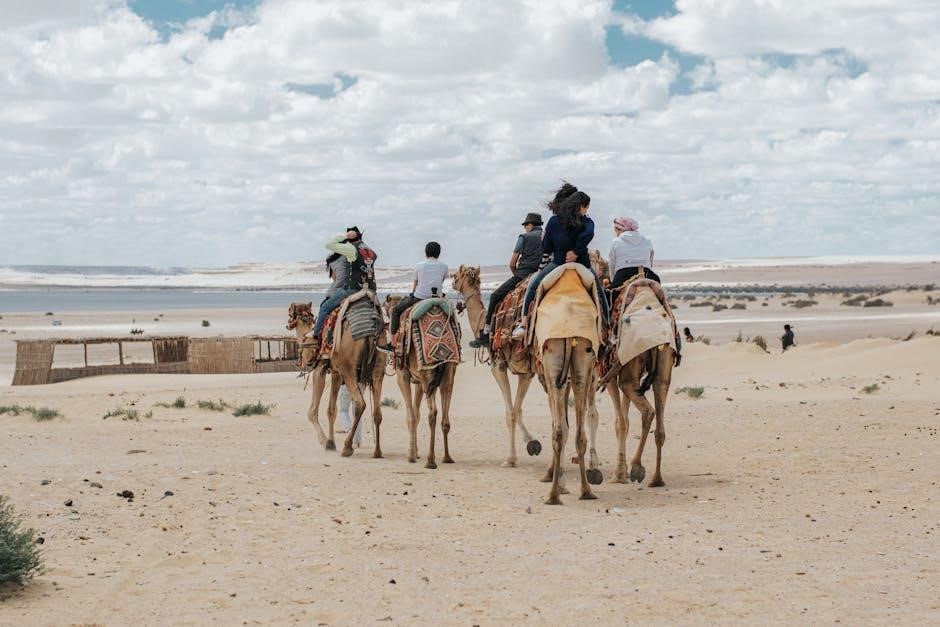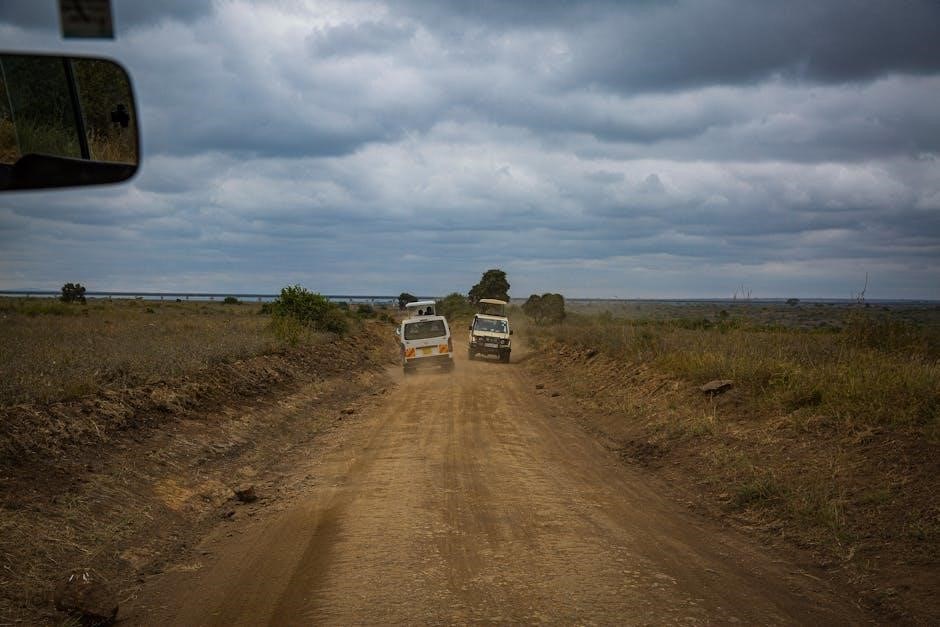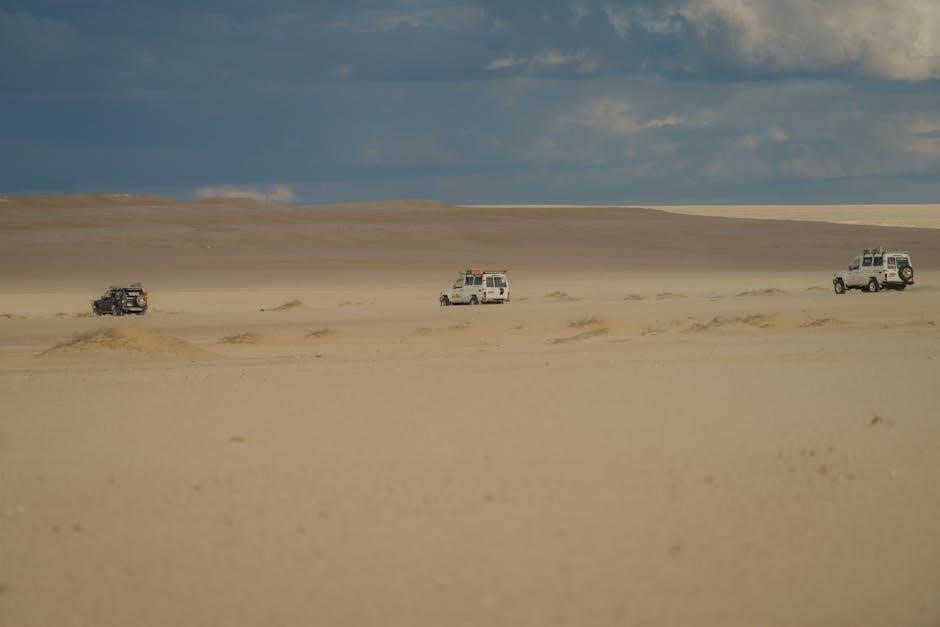
safari tour guide
Your expert safari tour guide for unforgettable adventures. Tips, experiences, and memories await!
A safari tour guide is an expert leader ensuring unforgettable wildlife experiences. Their deep knowledge, passion, and dedication create memorable adventures, connecting nature with enthusiasts.
1.1. The Role of a Safari Tour Guide
A safari tour guide serves as both an educator and storyteller, ensuring a safe and enriching experience. Their primary role is to provide expert knowledge about wildlife, ecosystems, and cultural contexts. Guides are responsible for creating engaging narratives, answering questions, and helping guests connect with nature. They also ensure safety by monitoring surroundings and educating guests on etiquette. A skilled guide adapts to group dynamics, tailoring the experience to meet diverse interests and preferences, ultimately crafting unforgettable memories for travelers.
1.2. Importance of Expert Knowledge in Safaris
Expert knowledge is crucial for a successful safari experience. A guide’s deep understanding of wildlife behavior, habitats, and ecosystems ensures guests witness rare species and understand their roles. This knowledge also enhances safety, as guides can anticipate animal movements and navigate challenging terrains; Additionally, expert insights enrich the tour by providing cultural and historical context, transforming a mere observation into a meaningful connection with nature and local traditions, creating lasting memories for participants.
Key Responsibilities of a Safari Tour Guide
Ensuring safety, providing wildlife knowledge, enhancing experiences, and navigating terrains are key roles of a safari guide, making each tour educational and enjoyable.
2.1. Ensuring Safety During the Safari
Safari guides prioritize safety, conducting thorough briefings and risk assessments. They ensure guests adhere to park rules, maintain safe distances from wildlife, and are prepared for emergencies.
2.2. Providing In-Depth Wildlife and Ecosystem Knowledge
Safari guides offer extensive insights into wildlife behavior, habitats, and ecosystems. They identify species, explain conservation efforts, and share fascinating facts, enriching the educational aspect of the tour. Their expertise helps guests appreciate the intricate balance of nature, fostering a deeper connection with the environment and its inhabitants.
2.3. Enhancing the Overall Safari Experience
A skilled safari guide elevates the tour by tailoring experiences to guests’ interests. They share stories, answer questions, and create a welcoming atmosphere, ensuring everyone feels comfortable. By handling logistics and unexpected situations, guides allow guests to focus on enjoying the adventure. Their passion and insights transform the safari into a memorable journey, blending education, excitement, and relaxation for an unforgettable experience.

Essential Skills for a Safari Tour Guide
Proficiency in communication, first aid, navigation, and wildlife tracking are vital. Guides must also adapt to diverse environments and ensure seamless experiences, blending safety with engagement.
3.1. Strong Communication and Interpersonal Skills
Effective communication is crucial for safari guides, fostering meaningful connections with guests. Clear storytelling, active listening, and empathy create engaging experiences. Guides adapt their delivery to diverse audiences, ensuring accessibility and entertainment. Strong interpersonal skills build trust and rapport, enhancing group dynamics. These abilities are vital for memorable and enriching wildlife adventures, making communication a cornerstone of exceptional safari guiding.
3.2. First Aid and Emergency Response Training
First aid and emergency response training are vital for safari guides, ensuring preparedness for accidents or illnesses in remote areas. Guides learn to administer basic medical care, stabilize injuries, and respond to emergencies like snake bites or allergic reactions. This training builds confidence in both guides and guests, fostering a safer and more enjoyable safari experience. It is a critical skill set that prioritizes guest well-being and safety in wilderness settings.
3.3. Navigation and Tracking Skills
Navigation and tracking skills are essential for safari tour guides to locate wildlife and ensure group safety. Guides use maps, GPS, and natural signs to navigate diverse terrains. Tracking involves identifying animal footprints, droppings, and behavioral patterns, enhancing the chance of spotting elusive species. These skills, often honed through extensive experience, allow guides to lead seamless tours, providing guests with unforgettable encounters and a deeper connection to nature’s wonders.

Qualifications and Certifications
Safari tour guides must hold certifications in first aid, wildlife knowledge, and guiding principles. Reputable associations ensure guides meet high standards, providing safe and informed tours.
4.1. Required Certifications for Safari Guides
Obtaining specific certifications is essential for safari guides to ensure competence and safety. Key certifications include first aid, wildlife conservation knowledge, and advanced guiding principles. Many countries require guides to complete rigorous training programs, often accredited by reputable organizations. For example, in Africa, the Field Guides Association of Southern Africa (FGASA) offers recognized qualifications. These certifications validate a guide’s ability to handle emergencies, identify wildlife, and navigate safely, ensuring a secure and educational experience for tourists while supporting conservation efforts.
4.2. Importance of Reputable Safari Guide Associations
Reputable safari guide associations play a crucial role in maintaining high standards within the industry. They ensure guides meet strict criteria for knowledge, safety, and ethical practices. These organizations often provide training, resources, and certification programs that enhance a guide’s professionalism. Joining such associations boosts a guide’s credibility and assures tourists of a safe, knowledgeable, and responsible safari experience. They also foster collaboration and continuous improvement among guides, promoting conservation and sustainable tourism practices for the benefit of both wildlife and visitors.

Choosing the Right Safari Tour Operator
Selecting a reputable safari operator ensures a safe and memorable experience. Research their safety records, reviews, and guide expertise to align with your expectations and preferences.
5.1. Researching Safari Operators
Thorough research is essential to select a reliable safari operator. Start by using specific keywords like “safari operator reviews” or “best safari tours” in search engines. Utilize Boolean operators to refine results and explore operator websites for detailed offerings. Read testimonials, check safety records, and verify certifications. Look for transparent information on guide qualifications, vehicle conditions, and ethical practices. Additionally, inquire about their experience in handling similar tours and their approach to wildlife conservation to ensure a trustworthy and memorable safari experience.
5.2. Checking Safety Records and Reviews
Evaluate a safari operator’s safety records by reading recent reviews and testimonials from past clients. Look for mentions of guide expertise, emergency handling, and vehicle maintenance. Check third-party platforms like Trustpilot or Google Reviews for unbiased feedback. Ensure the operator adheres to local safety regulations and has a clean track record. Positive reviews indicating knowledgeable guides and seamless tour execution are key indicators of a reliable and safe safari experience tailored to meet your expectations.
5.3. Evaluating Guide Experience and Expertise
A knowledgeable guide enhances your safari experience by providing insights into wildlife and ecosystems. Look for guides with extensive field experience and certifications from reputable associations. They should possess deep local knowledge, enabling them to track animals effectively and share fascinating stories. Ensure they are skilled in communication, making complex information accessible. A guide’s passion and expertise can transform your safari into an unforgettable journey of discovery and connection with nature.

Preparing for a Safari Tour
Preparing for a safari involves packing essentials, checking health requirements, and setting realistic expectations for an unforgettable adventure. Ensure a smooth journey by researching guides and understanding the tour’s demands thoroughly.
6.1. Packing Essentials for a Safari
Packing the right gear is crucial for a comfortable safari experience. Essentials include lightweight, neutral-colored clothing, sturdy footwear, sun protection, insect repellent, binoculars, and a reusable water bottle. Don’t forget a first-aid kit, camera, and extra batteries. Layers are important for varying temperatures, and a hat and sunglasses protect against harsh sun. Avoid bright colors to blend in with the environment. Ensure all items are eco-friendly to minimize your impact on nature. Proper packing ensures you’re prepared for the adventure ahead.
6.2. Health and Vaccination Requirements
Consult your healthcare provider for vaccinations and medications tailored to your safari destination. Ensure all routine vaccinations are up-to-date, and consider yellow fever or malaria prophylaxis if required. Pack insect repellent, sunscreen, and a first-aid kit. Stay hydrated and avoid undercooked foods. Check for any health advisories specific to your region. A pre-safari medical consultation is essential to address personal health needs and ensure a safe journey. Prioritizing health prepares you for an enjoyable and worry-free adventure.
6.3. Setting Realistic Expectations
Setting realistic expectations ensures a fulfilling safari experience. Understand that wildlife sightings can be unpredictable, and not every tour guarantees spotting specific animals. Be prepared for varying terrain, weather conditions, and physical demands. Listen to your guide’s advice and remain patient during animal tracking. Manage your time effectively, as wildlife viewing requires dedication and flexibility. Dress appropriately, stay hydrated, and maintain a positive mindset. A knowledgeable guide will enhance your experience by providing insights and adapting to your needs, ensuring memorable encounters with nature.
Wildlife Conservation and Safari Tourism
Safari tourism plays a vital role in wildlife conservation by funding protected areas and educating visitors about ecosystem preservation. Responsible tours support anti-poaching efforts and habitat restoration, ensuring biodiversity thrives.
7.1. The Role of Safari Tours in Conservation Efforts
Safari tours significantly contribute to wildlife conservation by generating funds for protected areas and anti-poaching initiatives. They also educate visitors about endangered species, fostering awareness and support for conservation. By promoting sustainable tourism, safaris encourage communities to value wildlife, reducing human-wildlife conflicts. Additionally, responsible safari operators often partner with conservation organizations, ensuring that tourism directly benefits ecosystems and biodiversity. This dual focus on education and financial support makes safaris a powerful tool for environmental preservation and ecological balance.
7.2. Ethical Practices in Wildlife Tourism
Ethical practices in wildlife tourism emphasize respecting animals and their habitats. Safari guides ensure tourists maintain safe distances, avoid feeding wildlife, and refrain from disruptive behaviors. Ethical operators support conservation projects and educate visitors on environmental sustainability. These practices promote the well-being of animals, preserve ecosystems, and foster a deeper appreciation for nature among tourists, ensuring responsible and sustainable wildlife tourism experiences.
Budgeting for a Safari Tour
Budgeting for a safari involves considering costs like permits, gear, and guides. Planning ahead and prioritizing expenses ensures a memorable experience without financial strain.
8.1. Understanding Cost Factors
When budgeting for a safari, key cost factors include permits, park fees, and guide services. Gear, transportation, and accommodations also contribute significantly. Seasonal demand and location impact pricing, with remote areas often costing more due to logistics. Additionally, the expertise of guides and the quality of tour operators play a role in pricing. Understanding these factors helps travelers allocate resources effectively for a memorable safari experience without overspending;
8.2. Hidden Expenses to Consider
Hidden expenses on a safari may include tipping for guides, additional park fees, or visa costs. Health vaccinations and medications, such as malaria prophylaxis, add to the budget. Optional activities like night drives or bush walks can incur extra charges. Travel insurance and single supplements for solo travelers are often overlooked. Understanding these costs helps avoid budget surprises and ensures a stress-free safari adventure tailored to your financial plan and preferences.
A knowledgeable safari guide enhances your adventure, offering insights and safety. Research operators, check reviews, and set realistic expectations for an unforgettable, well-planned safari experience tailored to your preferences.
9.1. The Importance of a Knowledgeable Safari Guide
A knowledgeable safari guide is indispensable for a safe and enriching experience. Their expertise ensures guests are well-informed about wildlife, ecosystems, and safety protocols. Guides with deep local knowledge enhance the adventure by spotting elusive animals and sharing fascinating insights. Their ability to interpret animal behavior and habitat dynamics creates unforgettable moments. Additionally, their role in promoting ethical tourism and conservation efforts highlights their value beyond just leading tours, making them a crucial asset to both travelers and wildlife preservation.
9.2. Final Tips for Choosing the Best Safari Experience
When selecting a safari, prioritize operators with proven safety records and positive reviews. Ensure guides are certified and experienced, as their expertise enhances the adventure. Research the operator’s commitment to conservation and ethical practices. Pack essentials like binoculars, comfortable clothing, and sunscreen. Set realistic expectations and stay flexible, as wildlife encounters can be unpredictable. Lastly, choose a tour that aligns with your interests, whether photography, birdwatching, or immersive cultural experiences, to maximize your unforgettable journey.